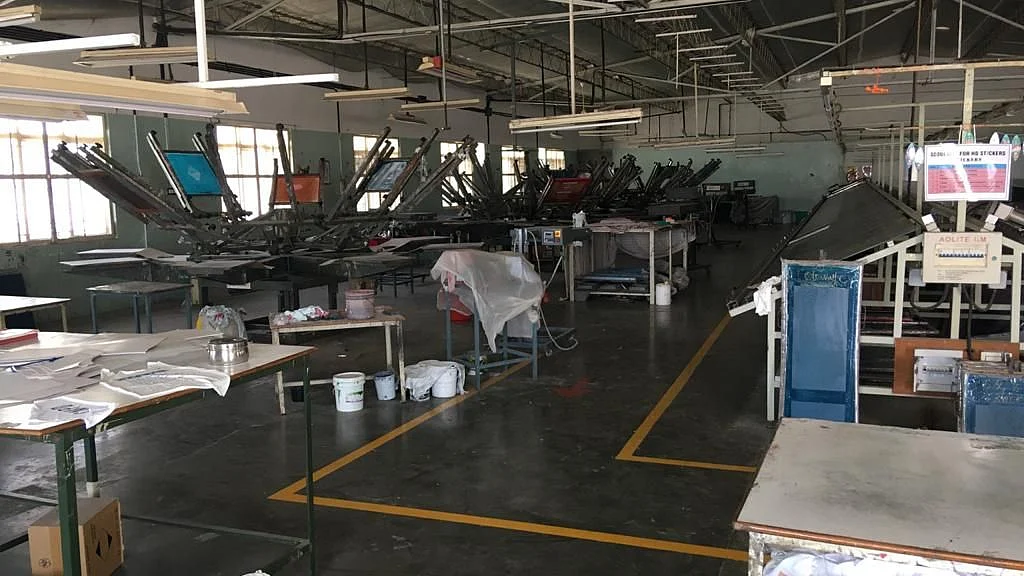COVID-19 Crushes Tiruppur Textile Industry, Losses Run Into Crores
Tamil Nadu’s textile hub Tiruppur, is now facing losses to the tune of Rs 10,000 crores only on exports.

advertisement
Video Editor: Deepthi Ramdas
Producer: Smitha TK
Tamil Nadu's Tiruppur, one of the most important textile hubs of India, is now bleeding and textile owners say that they have not been paid for Rs 10,000 crore worth of exported goods.
Home to over 10,000 factories with over 6 lakh labourers, the district has come to a standstill since the nationwide lockdown was announced on 25 March.
Tiruppur has the third most number of cases in the state, with 79 as on 14 April.
The Quint spoke to textile factory owners to understand how the crisis has taken a toll on the industry and how many factories are now switching to manufacturing masks and Personal Protective Equipment (PPE) as India fights against the spread of the highly infectious novel coronavirus.
Orders Cancelled, Payments Deferred
Raja M Shanmugham, president of the Tiruppur Exporters Association told The Quint that Rs 6000 crore worth of goods have been shipped to different countries but payment has not been made and goods worth thousands of crores, which were to be exported, are lying in the godowns. “In one strike, Tiruppur has been drained of liquidity,” he said.
The domestic supply has also been badly hit. With the lockdown, the new orders have come to a halt and many clients have even cancelled pre-existing orders.
“I got a call from a domestic vendor who said they wanted to cancel 40 percent of their order. Because people are not shopping and the morale of the people is bad, so they don’t expect to see a surge in purchasing even after the lockdown (ends),” he said.
Other factory owners also pointed out that they will soon be pressured to give discounts to clients in order to support businesses.
Labour-Intensive Industry That is Crying for Government Intervention
Factory owners have been instructed by the Centre and the state to pay their labourers and take care of their accommodation and other basic needs. The textile owners said they are taking care of migrant labourers who are staying in hostel-like accommodation but they are unable to financially support each one of them in this extended lockdown.
He proposed that the government steps in to give these workers monetary assistance.
Proposals to the Government
The textile factory owners in Tiruppur have discussed with the state textile ministry about how the government needs to adopt strategies to handle this crisis.
Shanmugam has appealed to the government to take the following steps to ensure ‘the industry doesn’t cease to exist:’
- Containment of coronavirus, which the government is already handling on a war-footing.
- Ensure economic well-being of the society, by supporting the labourers with monetary benefits.
- Special measures should be introduced to ensure all industries – micro, macro, small-scale, large-scale – should not be victimised in this process.
- Employees’ State Insurance Corporation (ESI) should take the responsibility to pay one month’s salary to all ESI card holders. As for the non-card holders, money can be deposited in their Jan Dhan accounts.
- The government should instruct banks to forgo at least 1-2 percent of the interest rate and then the government can help by reducing 2-3 percent, which needs to be extended to all term loans and working capital loans. He proposed that this scheme be extended for one year. And only simple interest should be calculated, without compounding every month.
Factories Switch to Production of Masks, PPEs
Over 100 factories have now switched to the production of masks and personal protective equipment (PPE).
They are each producing at least 50,000 masks everyday, by using about 200 tailors.
Presently, at least 2000-3000 tailors are working round the clock and many factory owners are considering switching to production of essential medical kits.
The factories have received a number of orders from hospitals and civic bodies in Tamil Nadu and also from other states in the country.
“Many factories have now understood that this is a brilliant business proposition. Clearly, this demand is going to grow not just in India, but globally too. Since most masks are for one-time use, the demand will always be robust,” said Shanmugam.
Ramesh, a technician at a factory in Palladam, said, “Earlier machines were placed close to each other. But now we have placed them a few metres apart. Every time an employee enters the factory, we make sure they sanitise their hands. We have already disinfected the entire space. We are putting our concerted efforts to stop the spread of coronavirus.”
Industrialists say with the lockdown, the supply chain has been broken and so procurement of raw materials has been a huge challenge.
“For anyone in the frontline against coronavirus – doctors, workers and even civilians – we are making such shields. It has been very difficult to procure raw materials, even transportation. If the government can help open a few textile shops here, then we can increase production multi-fold,” said Srinivasan Babu, a factory owner.
Factory owners believe it will take more than a year for the industry to revive once the heath crisis is controlled.